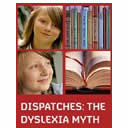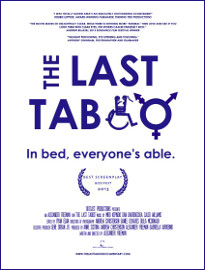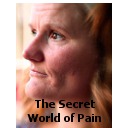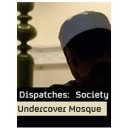The Dyslexia Myth
 Dispatches exposes the myths and misconceptions that surround a condition said to affect 10 per cent of the population. The Dyslexia Myth argues that the common understanding of dyslexia is not only false but makes it more difficult to provide the reading help that hundreds of thousands of children desperately need.
Dispatches exposes the myths and misconceptions that surround a condition said to affect 10 per cent of the population. The Dyslexia Myth argues that the common understanding of dyslexia is not only false but makes it more difficult to provide the reading help that hundreds of thousands of children desperately need.
Drawing on years of intensive academic research on both sides of the Atlantic, Dispatches challenges the existence of dyslexia as a separate condition; but in doing so, reveals the scale and pain of true reading disability.
The programme examines the chasm between evidence and educational practice and shows that, after hundreds of millions of pounds of investment in the teaching of reading, the number of children encountering serious problems has hardly changed.




I don't understand why any parent would expect the educational system to fix their kids dyslexia. Schools are overcrowded, funds are cut, if one teacher has 20 kids and the class is 60 minutes they have less than 3 minutes to spend with each individual. There is a chance a teacher might help but the parents shouldn't count on it. If a parent who actually lives with the child doesn't pick up on their dyslexia how would a teacher that only sees them for 3 minutes a day?
this is rubbish. I know people who have dyslexia, I have dyspraxia and dyscalculia. This is a real problem not a myth
Either you did not watch the movie or did not get the argument made there.
That's a lot of things to have. Do you also have dyswatchingcomprehensia. My guess is if you have all those you are actually stupid and use them as a comfort blanket. I was diagnosed at 7 as having Dyslexia, I was in the paper. I am now 33 and I can tell you that it was a massive scam. They did no tests, saw a person who read a bit worse than other children and decided to label me. Yet they never actually checked to see if I was any worse than other children in any sort of scientific manner. Why was I singled out? because I misbehaved. Dyslaxia is made up.
one thing i dont understand... how can deaf people read if they are right?
Quote
"Dyslexia is primarily an information processing difficulty, neurological in origin and affecting language. It is not just about reading. BDA has made this point from the outset to the producer of the Channel 4 programme.
Acquiring the skills of reading is often problematical for those with dyslexia alongside a range of other processing skills including organisation, sequencing and retrieval of information, short-term memory, spelling, writing and number.
Of course BDA welcomes research into improving the acquisition of reading for all children as indeed for all learners.
However, since dyslexia is not encompassed wholly by reading, acquiring reading does not solve dyslexia or render the term redundant or place it in the realms of an ‘emotional construct’.
The majority of the six million dyslexics in the UK will have acquired the skills of reading: they remain dyslexic, and are entitled to receive recognition and support as enshrined in the Disability Discrimination Act and Disabled Student’s Allowance for Higher Education."
Dyslexia – The myth
I had a 6 year old son who had trouble learning how to read although my wife and I really did not notice it until his younger sister was reading proficiently at 5-6 years of age. By now our son was 8 years old and did not want to go to school because he kept falling behind.
As a solution I volunteered to stay at home and spend one on one time with my son to get his reading up to par. We spent about 4 months at home together with my son being home schooled, when my former spouse just freaked out that her son was falling ever more behind in school.
I was subsequently divorced and kicked out of the house so that my former spouse could take complete control of her son, get him back into school and into an after school reading program.
This is an extreme example of a situation that can develop between parents who decide to home school their children for whatever reason. In this case it was because my son who was in Grade 3 was having trouble reading and simply did not want to go to school.
The above is not an uncommon situation. I would later hear many similar stories from both mothers and fathers. Mothers in general however tend to panic the most first. Mother's are constantly comparing the abilities of their children with other mother's and if one child is behind they begin to worry excessively.
It was unfortunate that things turned out the way they did, as my son was making dramatic progress with his reading with the one on one attention. My former spouse however refused to believe it. If her son was not in school, he was not learning. I do not what happened after the divorce as I was banned from ever seeing my kids again with a court order. So I have no idea if this problem continued or later self corrected as his brain matured and developed further.
After watching this program it is easy to see how so many parents (especially mothers) over react to a child who is having trouble learning how to read. It is nice to see that what was once commonly thought of as dyslexia is really rooted in human brain development issues.
This does not mean that real cases of dyslexia exist but rather that a huge majority of cases are not dyslexia, but rather slower brain development issues that will correct themselves in time.
Instead what may be happening is that the human brain is simply taking longer to develop in the area of sounding out words compared to other kids. (Based on this programs finding.)
The invention of modern day schools is very recent within the past 100 years or so and so there is this current need and requirement to make sure that every child is progressing in exactly the same way.
Nature however does not seem to work like this and there are many kids with differing abilities, one of those differences being reading.
From my own experience with my son and watching this program, parents and educators need to be aware of the fact that human brains develop at their own unique pace and one standard does not fit all.
With regards to my son who had trouble reading, intelligence was not even an issue. Put him on a PlayStation 2 and his hand eye coordination and problem solving skills were absolutely incredible. There was no way I could ever beat him.
So after watching this program and knowing the time and energy I spent with my son one on one, I firmly believe human brains all develop at different rates in different areas. In many cases reading is temporarily slowed down until speech catches up.
Arnold Vinette
Ottawa, Canada
That's terrible, Arnold. Jeez.
Well said Sebastian Stephenson. After watching the documentary I came to the same conclusion. Just wanted to add few more thing.
Dyslexia is not a myth but the people who are not having dislexia are commonly connect it with particular one problem in this case its reading.
Dyslexia is a neurological disorders and with the help of the tool called brain mapper it can be differentiates visually.
Because of the ratio which is around 1:25 educational industry so called schools and collages are not aware of it. In developing countries dyslexic people mostly end up taking labor jobs though they are intelligent.
Dyslexia is a gift but only when people except it and treat them fairly.
Note: I have dyslexia
I agree, after around 1990's stats started to come out that the population of people who are dyslexic was 25%. Prior t that, it was believed that girls were 1/4 as likely to be dyslexic than boy. Now it is understood that girls are just as likely to be dyslexic as their counter parts, boys.
The problem is that whenever I come across what is suppose to be an informed source on the subject, that I have not seen any of these place make the proper adjustment. Because of this now days when doing a search on the percent population, it still states a range from 13-17 percent. Stating the old statistics. Even worse, they do not even state the source for the information, but state these diminished incorrect stats as facts.
What I am getting to is that if anyone comes across the correct stats, and explains the difference to the old stats, and the false stats being used now days, I would be appreciative of your help.
I believe that having this bit of information as hand will help me much more to get the assistance from experts who are are using the false old stats still today because it demonstrates a greater public need to insure people with this disability are getting the proper accommodations they need and have a right to.
Also to show an public need to insure people with disabilities as a whole, I am looking for another statistical fact that I came across a long time ago, and had lost due to my home being flooded. I came across information where a person was addressing either the Senate or Congress during disability month, and stated that 52% of the population had some form of a disability. That is more than half. Though when talking to most people even so called experts, their belief is that it some small none important percentage of the public population. Because of that, it's none important to have to feel they should have to address people with disabilities. If I can demonstrate that it is actually more than half, I can argue that it is not a minority, but a majority, and thus demonstrates an need for the population to take proper accommodation for the disabled seriously.
Think about this, at work , and school it is as if people with disabilities are none existent. Because of this the public does not feel there is really a need to be concerned with such things. For those that have gone to college, imagine what percent of the campus population do you believe you saw, who were disabled in some way, or was getting assistance, and reasonable and necessary accommodations from the school?
Most likely you had not seen anyone that fit this description but yourself. Even if you had seen someone, it would be more likely that person may only represent possible 1/1000 at best, and that is most likely being far too kind to the schools to say they actually had that big of a ratio on campus.
If anyone is a computer wiz, I would love to create a web sight so we can develop a net work for us all to be in contact and work together in a more organized way to help inform the public and to assist in people getting the help they need as well.
Quarterback3x@yahoo
This doc does not really say that dyslexia doesn't exists, its more about reading and that dyslexia has nothing to do with a child's ability to read.
Dyslexia is more than just reading. It's one part of the condition. Math problems, handwriting and memory problems are other conditions associated with dyslexia.
The man who talks to the teachers early on in the doc says that there is no such thing as dyslexia, He is a reading expert. Not a learning expert. He is biased.
I personally believe that Dyslexia is not a learning difficultly, we can learn but just differently. It's really more of a systemic problem, that education facilities can not deal with Dyslexia, which in a sense is what the documentary gets at.
Not to mention that the doc actually is not really about dyslexia but more about reading in Britain which would be down to media spin, thinking that they would get more views calling it the "dyslexia myth" than the "reading myth".
Note: I have Dysgraphia
@ fi fi
I agree a lot with what you said, actually i learned some things too. My question to you is, isn't most of the class day spent on things that involve reading to begin with? I just remember that any 'special' programs i did in elementary school were like a half-hour long, then it was back to the school room to read and write...then again i learned to read at a private school, so maybe what i did is a little different than most.
This sentence has no reference to english other than phonetics and lack of understanding of the words. If someone wrote like that I wouldn't say they had a disability I would say that flatly did not know english.
"Four ample these sentience well note wring alum bills butte cud bee right in buy sum won wit tissues."
Maybe classes are different now but I remember years of taking the same sounding words and explaining what made them different. Personal pet peeve is their, there, and they're abused - no surpise that your you're fit in too. Anyway, about the doc if schools need to call it something to get the children extra help I say keep the name. Earliy reader here, was college lvl before high school and it was because I was nurtured to read. Some of my earliest memories are my mother speaking slowly to me so I do think environment plays a large part in things. Anyone else find it funny that they have thick british accents and try to make the children read witout them when they admit that sounds you hear can become an influence. Maybe some of these kids are really bi-lingual - they speak the way mommy and daddy do and the way school tells me to. Who is slow now :P
@Louise
I didn't rely on spell checker. I just wrote the thing and hit post. It was also like 1:00 in the morning. I watch documentaries during my vacation times and stay up late and post things when I'm tired.
I love how everything else in there was perfect. Grammar, everything and you chose to do a rant on my one misspelling. I'm not a dance teacher. I'm a special education teacher. If you had reading comprehension skills you'd know that.
@fifi I agree with you but you should, especially as a teacher, know that you should not rely on spell checker. I believe you meant to say "minute" not "minuet". (Unless you are a dance teacher?!?) Please understand I'm not trying to hurt you. It concerns me that so many people I read on the internet have so many errors. I think "spell check" should be called "typing check", it only really helps us spot errors. My husband has a reading disability and spell check does not help at all. If he puts in a word that is completely wrong but spelled correctly nothing will show up and if it does show up is doesn't offer alternatives effectively.
Four ample these sentience well note wring alum bills butte cud bee right in buy sum won wit tissues.
This is extreme but all the words in this sentence, "For example this sentence will not ring alarm bells, but could be written by someone with issues.", have been used by my husband incorrectly. My husband recognizes words mostly by their shape, so if it has about the right number of letters and some letters right he can't tell it's wrong.
In Texas we have READING RECOVERY,my daughter did it and she gets all A's and is in top of her class now!
Could you please share more about READING RECOVERY? I also live in Texas, most of my family are teachers, and I also have worked as a substitute teacher for many years and have never come cross this.
I would like to know more about it and how I can possible make use of it, or direct those I come across who could benefit from it, and would like to know what it is and how it works.
I agree with you Michael. I am a special ed teacher and I work for a large urban school district in America. They have good interventions but do not implement them correctly sometimes. We have here what is known as the response to intervention model. It is very similar to what they spoke of in the documentary about how most kids will learn but 1/5 will have difficulty and they get extra help. The idea is that a child like that needs 20 minuets extra small group help or in the case of even smaller percentages, 30-45 minuets of no larger than 3 to 1 help. Now, my issue is, that these students in our school get the help instead of their regular reading time vs. their regular reading time plus the intervention. The school claims there is no time for this. They don't want to pull kids from specials such as art, music, ect. They can't take from other core subjects. Not to mention our school is dealing with a 90% English language learning population, so you can't take their language development time which is a whole other program that doesn't work that I'm not going to go into. Anyways, I advocate that these kids need to be taken from the specials and all I get is that might be where the child shines. Well the kid can go back to specials after he's gone through the program. They showed that the kids catch up quickly once they are given the proper intervention. Shine? Well shit guys, you need even some rudimentary reading skills to work at a McDonalds and I seriously doubt the kid is the next Caravaggio. If her is, he'll come out ok, if not, he needs reading more than finger painting. I've just begun to rant at this point, but it angers me that things aren't being done properly with something so important.
It's ridiculous.... Japanese lacks L, not R!
I have dyslexia and severe dyscalculia. Nothing is spent on treatment for me. I just have to work harder at reading and math.
I have the so called 'dyslexia' and have faced many problems with it but, what is documentary present to us is that there is know such thing as 'dyslexia'. So have would adult with reading problems fell about this if there so called 'dyslexia' if this is taken from them they may feel stupid I know I would what do we do when we lose faith in our selfs?
The point was use the NZ Reading Recovery programme and do it well.
The doco clearly shows the issue isn't with dyslexia (or specific learning difficulties), but with the underfunding of reading recovery and poor parenting (environment).
NZ also runs a good speech therapy programme that may be of interest.